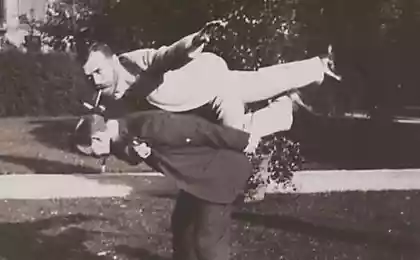198
Priming: What it is and how it works
Imagine sitting in the hallway before an important exam at a university, waiting for the door to the classroom to open. And then you sit down with a person who starts a conversation with you on some abstract topic. For example, how great it is to be a teacher at a university, to do scientific work and help students become professionals. Or, for example, how fun it is to be a football fan, blow at the pipe and throw bottles from the stands, and after the match to drink beer and start fights with fans of other teams.
He discusses this with you for just three minutes, then leaves... and after a quarter of an hour or half an hour the exam begins. Do you think this three-minute conversation could have affected your exam results?

Practice shows that he could. In a psychological experiment where a group of students were randomly divided into two parts, and one half was asked to think about the work of a professor at the university, and the other – about the life of a football fan, the results were different. Students from the first group answered an average of 56% of the exam questions, while students from the second group answered only 43% of the questions. This is the difference between a passed and a failed exam.
This is how priming works – one of the most interesting ways to manipulate your consciousness.
What is priming and how does it work
At the beginning of the XX century, the goalkeeper of the Czech national team Frantisek Planichka was famous for his ability to confidently beat back even the best scorers. When his goal was appointed eleven-meter, he, as if out of frustration, tore off his cap, threw it at the gate and took his position. Nine times out of ten, the opponent’s football player hit exactly the corner of the goal where the cap flew.
Psychologically, this is a classic example of priming.
At the end of the twentieth century, psychologists discovered something quite interesting. If any two events follow one another, the impressions of the first event greatly influence your attitude towards the second, even if they are logically unrelated.
One of the most famous experiments in the field of priming was the following: people were asked to write on a piece of paper the last two digits of their passport number, or spin a roulette and write down the number that will fall out. After that, they were shown a product (toy, electrical appliance, etc.) and asked to give the most likely price at which the product is sold in the supermarket.
It turned out that the figures recorded by the participant in the first part of the experiment often appeared in the second part. If the number 14 was on roulette, five minutes later the person said that the teddy bear should cost $14 in the store – and the person who had the number 8 assumed that the same bear should cost $8 and not a cent more.
There is no logic in this - just previous experience influenced the next one.

Going back to the example of the conversation before the exam, the students in the first group were pushed to think about an intellectual person, solving complex problems, successful in the academic field, and these thoughts set the participants to intellectual work. And the students from the first group were tuned to thoughts about the actions of anti-intellectual, sloppy - and they went to the exam in this mood.
Priming conscious and unconscious
Priming can be conscious or unconscious. Either conscious or unconscious.
It is possible to control the behavior of people in a situation of choice through preliminary preparation with the help of rational arguments. This, for example, is often done by lawyers, gradually bringing the judge or jury to the right opinion. Many examples on this topic can be found in the court appearances of the famous Russian lawyer Plevako.
For example, when a tradeswoman was tried for not closing the store after the due time (as required by law) on the eve of a religious holiday, Plevaco came to the courtroom a little late, and in response to the judge’s remark, said, “Your Honor, twenty minutes past eleven?” I only have five minutes on me. And you, Mr. Prosecutor? Quarter past eleven? And the secretary? After the judge was convinced that everyone's watches showed different times, Plevaco closed the case with just one sentence: "If we - responsible, educated, important people - can not set our watches accurately, will we condemn for the same simple shopkeeper?"
Sometimes priming is unconscious, when a person does not realize before or after that he has been influenced. Hardly one of the hundreds of players who have ever hit the goal of Planichka, would believe that the abandoned cap of the goalkeeper controlled his behavior.
Unconscious priming can be carried out by selecting words or pictures that cause the manipulator’s association in the victim’s brain.
Priming drives intelligence
I told you earlier today about an experiment where a student's ability to solve problems was enhanced or weakened by just a harmless conversation about the life of a professor or the life of a football fan. And here's an even more brutal experiment.
The university identified students who came out of some problem group. Negroes, people with criminal records, former drug addicts, etc. And they divided them into two groups. One simply passed the written exams, and the students in the second group before the exam, the teacher asked, “You’re from Harlem (you were in prison, used to take drugs), right?” – and only after that he issued sheets with the task.
The second group performed much worse on the exam tasks, and it does not matter what subject the exam was in. Reminder of a dysfunctional past instantly switched the student’s brain to thinking about his problems, shortcomings and weaknesses, and this undermined his self-confidence, and as a result, his ability to solve problems.

Priming drives aggression
In another famous experiment, people were first asked to play a game where they had to pull cards with different words from a deck and spread them around the playing field, and then, in the second part of the experiment, the same people were asked to express their opinion about one of the politicians. However, half of the participants were given cards with emotional, aggressive words ("killer", "war"), and the other half - cards with neutral words ("weather", "move").
As a result, the statements of those people who were shown cards with emotional words turned out to be much more aggressive, harsh and evaluative than the statements of those people who in the game obtained neutral cards. Although the game had nothing to do with the policy that was proposed to be evaluated, and even with politics in general.
Priming drives well-being
Even more interesting is the experiment in which people were asked for 15 minutes to supplement sentences from which individual words were removed. However, the participants were divided into two groups, one of which was given to complete phrases that included words related to old age (“old man”, “cane”, “decrepit”, “wrinkles”, “home for the elderly”, “pension”, “elderly”), and the other half were offered similar phrases with neutral words.
For example, the first group was asked to complete the phrases “An old man crosses the street on a pedestrian ______” and “A passenger forgot his cane in the ______ subway”, while the second group received the phrase “A man crosses the street on a pedestrian _____” and “A passenger forgot his umbrella in the __________ subway”.
When people were released from the audience after 15 minutes, the first group walked down the hallway to the front door much slower than the second group – although before the experiment they moved at the same speed.
Priming drives interest
Another study on priming showed that if a person watches two consecutive videos – a television program on economics and a speech by a presidential candidate – the viewer pays more attention to economic aspects in the speech of a politician.
However, if you replace the economics program with a criminal chronicle, attention will shift to the part of the politician’s speech where he talks about the rule of law. If a film about terrorism acts as a substitute, then when watching a politician’s speech, the viewer’s attention will go to arguments about national security. And so on.
In the same way, you can get people to notice certain details in the big picture by talking to them about blue butterflies or red apples – accordingly, the first person will notice more blue elements in the picture, and the second – red ones.
How to protect yourself from priming
First and foremost, it’s important to understand that priming alone can’t make you do something unnatural. You can’t use priming to make you eat a nail or change your sexual orientation.
Rather, priming allows in situations where you can make a choice between A and B, and both options are natural and acceptable for you - buy a girl flowers or chocolate, interrupt the conversation of colleagues or wait for it to end, walk down the corridor quickly or slowly, go on vacation to Paris or London - tip the scales in the desired direction. Or adjust the impression of your business or your product in the right direction
If you want to sell more French wine, put French chanson in the supermarket, if you want to sell more Italian wine, play Celentano songs. If you want food in the supermarket to be perceived as fresh, put live flowers at the entrance. And so on.
So fear of priming beyond measure is not worth it. But if you have reason to believe that somewhere you are exposed to it, and you would like to protect yourself from this manipulation, then remember that The key here is awareness and thoughtfulness..
6 types of manipulation in communication: how not to become a victim
Manipulation through feelings
Therefore If you suspect you’re being manipulated by priming, do something simple. Put off making a decision for a while. And then think about your choices from the start, focusing only on that issue and not being distracted by others.
The recipe is simple, but it really works. published
Author: Alexander Levitas
P.S. And remember, just by changing your consciousness – together we change the world!
Source: alex-levitas.livejournal.com/544443.html
He discusses this with you for just three minutes, then leaves... and after a quarter of an hour or half an hour the exam begins. Do you think this three-minute conversation could have affected your exam results?

Practice shows that he could. In a psychological experiment where a group of students were randomly divided into two parts, and one half was asked to think about the work of a professor at the university, and the other – about the life of a football fan, the results were different. Students from the first group answered an average of 56% of the exam questions, while students from the second group answered only 43% of the questions. This is the difference between a passed and a failed exam.
This is how priming works – one of the most interesting ways to manipulate your consciousness.
What is priming and how does it work
At the beginning of the XX century, the goalkeeper of the Czech national team Frantisek Planichka was famous for his ability to confidently beat back even the best scorers. When his goal was appointed eleven-meter, he, as if out of frustration, tore off his cap, threw it at the gate and took his position. Nine times out of ten, the opponent’s football player hit exactly the corner of the goal where the cap flew.
Psychologically, this is a classic example of priming.
At the end of the twentieth century, psychologists discovered something quite interesting. If any two events follow one another, the impressions of the first event greatly influence your attitude towards the second, even if they are logically unrelated.
One of the most famous experiments in the field of priming was the following: people were asked to write on a piece of paper the last two digits of their passport number, or spin a roulette and write down the number that will fall out. After that, they were shown a product (toy, electrical appliance, etc.) and asked to give the most likely price at which the product is sold in the supermarket.
It turned out that the figures recorded by the participant in the first part of the experiment often appeared in the second part. If the number 14 was on roulette, five minutes later the person said that the teddy bear should cost $14 in the store – and the person who had the number 8 assumed that the same bear should cost $8 and not a cent more.
There is no logic in this - just previous experience influenced the next one.

Going back to the example of the conversation before the exam, the students in the first group were pushed to think about an intellectual person, solving complex problems, successful in the academic field, and these thoughts set the participants to intellectual work. And the students from the first group were tuned to thoughts about the actions of anti-intellectual, sloppy - and they went to the exam in this mood.
Priming conscious and unconscious
Priming can be conscious or unconscious. Either conscious or unconscious.
It is possible to control the behavior of people in a situation of choice through preliminary preparation with the help of rational arguments. This, for example, is often done by lawyers, gradually bringing the judge or jury to the right opinion. Many examples on this topic can be found in the court appearances of the famous Russian lawyer Plevako.
For example, when a tradeswoman was tried for not closing the store after the due time (as required by law) on the eve of a religious holiday, Plevaco came to the courtroom a little late, and in response to the judge’s remark, said, “Your Honor, twenty minutes past eleven?” I only have five minutes on me. And you, Mr. Prosecutor? Quarter past eleven? And the secretary? After the judge was convinced that everyone's watches showed different times, Plevaco closed the case with just one sentence: "If we - responsible, educated, important people - can not set our watches accurately, will we condemn for the same simple shopkeeper?"
Sometimes priming is unconscious, when a person does not realize before or after that he has been influenced. Hardly one of the hundreds of players who have ever hit the goal of Planichka, would believe that the abandoned cap of the goalkeeper controlled his behavior.
Unconscious priming can be carried out by selecting words or pictures that cause the manipulator’s association in the victim’s brain.
Priming drives intelligence
I told you earlier today about an experiment where a student's ability to solve problems was enhanced or weakened by just a harmless conversation about the life of a professor or the life of a football fan. And here's an even more brutal experiment.
The university identified students who came out of some problem group. Negroes, people with criminal records, former drug addicts, etc. And they divided them into two groups. One simply passed the written exams, and the students in the second group before the exam, the teacher asked, “You’re from Harlem (you were in prison, used to take drugs), right?” – and only after that he issued sheets with the task.
The second group performed much worse on the exam tasks, and it does not matter what subject the exam was in. Reminder of a dysfunctional past instantly switched the student’s brain to thinking about his problems, shortcomings and weaknesses, and this undermined his self-confidence, and as a result, his ability to solve problems.

Priming drives aggression
In another famous experiment, people were first asked to play a game where they had to pull cards with different words from a deck and spread them around the playing field, and then, in the second part of the experiment, the same people were asked to express their opinion about one of the politicians. However, half of the participants were given cards with emotional, aggressive words ("killer", "war"), and the other half - cards with neutral words ("weather", "move").
As a result, the statements of those people who were shown cards with emotional words turned out to be much more aggressive, harsh and evaluative than the statements of those people who in the game obtained neutral cards. Although the game had nothing to do with the policy that was proposed to be evaluated, and even with politics in general.
Priming drives well-being
Even more interesting is the experiment in which people were asked for 15 minutes to supplement sentences from which individual words were removed. However, the participants were divided into two groups, one of which was given to complete phrases that included words related to old age (“old man”, “cane”, “decrepit”, “wrinkles”, “home for the elderly”, “pension”, “elderly”), and the other half were offered similar phrases with neutral words.
For example, the first group was asked to complete the phrases “An old man crosses the street on a pedestrian ______” and “A passenger forgot his cane in the ______ subway”, while the second group received the phrase “A man crosses the street on a pedestrian _____” and “A passenger forgot his umbrella in the __________ subway”.
When people were released from the audience after 15 minutes, the first group walked down the hallway to the front door much slower than the second group – although before the experiment they moved at the same speed.
Priming drives interest
Another study on priming showed that if a person watches two consecutive videos – a television program on economics and a speech by a presidential candidate – the viewer pays more attention to economic aspects in the speech of a politician.
However, if you replace the economics program with a criminal chronicle, attention will shift to the part of the politician’s speech where he talks about the rule of law. If a film about terrorism acts as a substitute, then when watching a politician’s speech, the viewer’s attention will go to arguments about national security. And so on.
In the same way, you can get people to notice certain details in the big picture by talking to them about blue butterflies or red apples – accordingly, the first person will notice more blue elements in the picture, and the second – red ones.
How to protect yourself from priming
First and foremost, it’s important to understand that priming alone can’t make you do something unnatural. You can’t use priming to make you eat a nail or change your sexual orientation.
Rather, priming allows in situations where you can make a choice between A and B, and both options are natural and acceptable for you - buy a girl flowers or chocolate, interrupt the conversation of colleagues or wait for it to end, walk down the corridor quickly or slowly, go on vacation to Paris or London - tip the scales in the desired direction. Or adjust the impression of your business or your product in the right direction
If you want to sell more French wine, put French chanson in the supermarket, if you want to sell more Italian wine, play Celentano songs. If you want food in the supermarket to be perceived as fresh, put live flowers at the entrance. And so on.
So fear of priming beyond measure is not worth it. But if you have reason to believe that somewhere you are exposed to it, and you would like to protect yourself from this manipulation, then remember that The key here is awareness and thoughtfulness..
6 types of manipulation in communication: how not to become a victim
Manipulation through feelings
Therefore If you suspect you’re being manipulated by priming, do something simple. Put off making a decision for a while. And then think about your choices from the start, focusing only on that issue and not being distracted by others.
The recipe is simple, but it really works. published
Author: Alexander Levitas
P.S. And remember, just by changing your consciousness – together we change the world!
Source: alex-levitas.livejournal.com/544443.html























